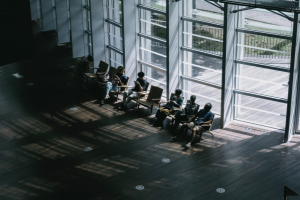Are you planning to cut time spent on screens, social media, and/or your smartphone in 2024? You’re not alone. Research on New Year’s resolutions among the Dutch showed that especially Gen Z’ers (63%) mentioned aiming for less crowded agendas, more social contact, and less time on their screens in 2024.
Remarkably, the youth especially seem to wish for the things in life that were common in our pre-smartphone era, before they were born. We analyzed how the excessive smartphone usage of Generation Z might stand in their way of achieving their resolutions.
Resolution 1: A less crowded agenda
Tech improvements have reduced the time it takes to clean, to get from A to B, to arrange something, and this list goes on, freeing up lots of time. However, it hasn’t led people to feel they have more time. On the contrary, our smartphones allow us to feel always-on; 24/7, we can arrange something, order groceries, contact someone, or reply to an email. This makes many feel busier than before, even though we don’t actually have more things to do.
Resolution 2: More Social Contact
It has become easier to reach out and stay in touch with someone from all over the world. However, although being more connected, Gen Z doesn’t always feel connected. According to Norena Hertz, one of the reasons why many Gen Z’ers feel lonely today is that it has been easier for kids to feel excluded due to what they see others doing and posting on social media. Before, it was more a matter of ‘ignorance is bliss.’ Now, you know exactly which parties you haven’t been invited to.
However, it’s not that social media in itself is always harmful for Gen Z’s feelings of connectedness. If teens use social media mainly to stay in touch with friends whom they also see face-to-face on a regular basis, it isn’t problematic, research shows. But when using phones replaces face-to-face interaction, it can be. So it’s the absence of face-to-face interaction, not the presence of phone use, that’s the problem.
Resolution 3: Spending less time on their screens
Much of what we consume through our screens is aimed at giving us whatever provides us with dopamine (pleasure) straight away. From gaming, watching a movie, listening to music, reading romantic novels, having sex, food, etc. And although this might give us a good feeling at the moment, if we overdo it, our brains cannot restore the balance: the initial spike of dopamine gets weaker and shorter, and the after-effect, which causes pain, gets stronger and longer. We need more of that same thing to still feel pleasure out of it. Meaning that overdoing it on short-term pleasure leads to the opposite of pleasure.
Although some tech developments might initially have aimed to support people in making their lives more efficient, more socially connected, or more fun, the contrary is often the case. Smartphone usage brings Gen Z’ers a lot, however spending a bit more time outside their phones might be a fruitful way for them to achieve their resolutions.

Author
Kim Pillen











